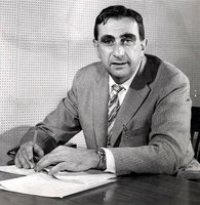Teller, Edward (Energy)
Teller, Edward
Edward Teller (1908-2003), a Hungarian physicist known for his contributions to the first demonstration of thermonuclear energy and his work in quantum theory, molecular physics, and astrophysics. He was known colloquially as "the father of the hydrogen bomb." In 1942, Teller joined the Manhattan Project at Columbia University and the University of Chicago with Enrico Fermi and Leó Szilárd. Teller fiercely advocated the development of nuclear weapons into a fusion-based "Superbomb”—an early version of the hydrogen bomb—rather than relying solely on the fission-based atomic bomb. Following the Soviet test detonation of an atomic device in 1949, he returned to Los Alamos in 1950 to join the hydrogen bomb program, established by President Harry S. Truman based on Teller's initiative. The first hydrogen bomb to use the Teller-Ulam configuration was detonated in the Marshall Islands on November 1, 1952. Teller fell out of favor with his colleagues when he was the lone scientist to label Robert Oppenheimer, the Scientific Director of the Manhattan Project, as a security risk. In the 1980s, Teller initiated an aggressive campaign for what was later called the Strategic Defense Initiative, labeled as "Star Wars", which would use lasers or satellites to destroy incoming Russian Intercontinental Ballistic and Cruise Missiles (ICBMs).
